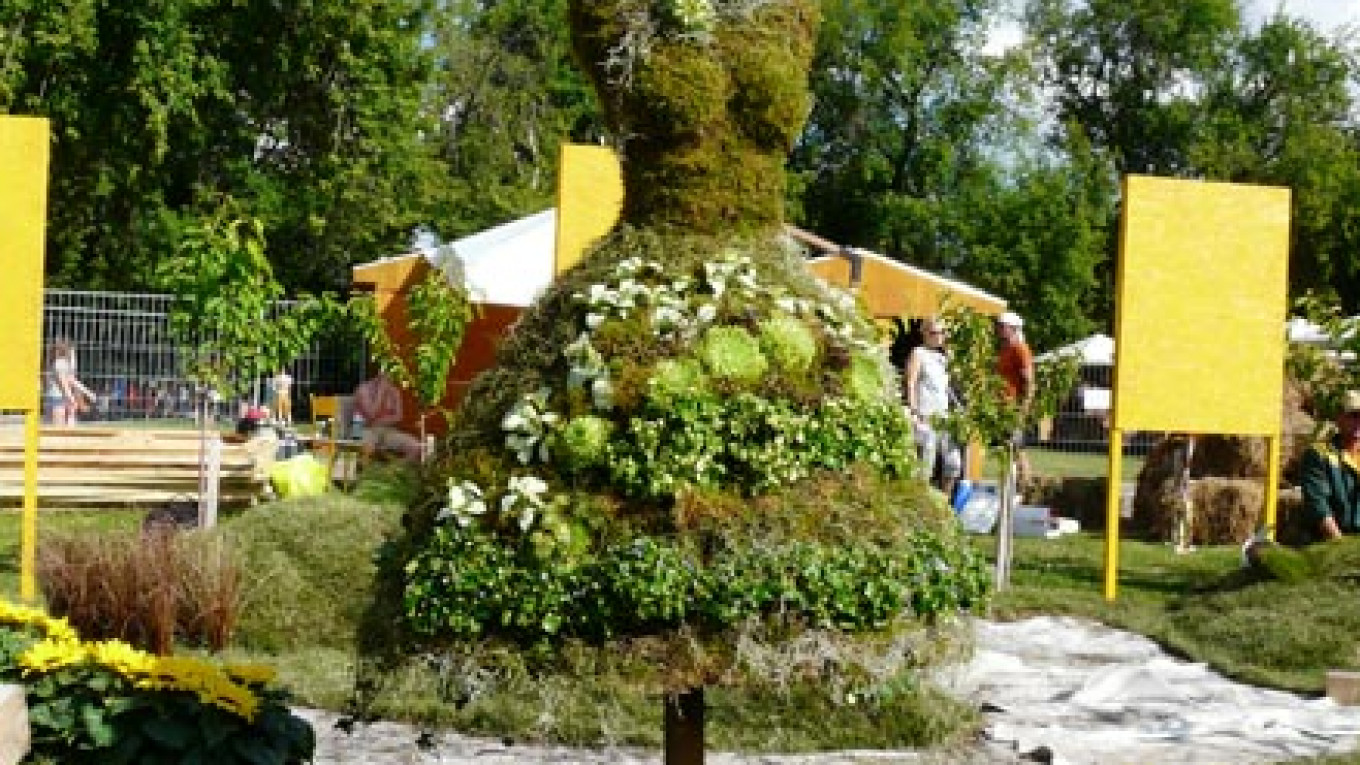Enthusiastic horticulturalists from Italy, the U.S., England and, of course, Russia flocked to Gorky Park last weekend to perfect their plots for Moscow's second flower show, being held in the sunny city oasis of Gorky Park until June 23.
In the hustle and bustle of the competition's set up, a slightly surreal collection of objects and shapes could be picked out: A large pear-shaped tree made entirely of lemons, a Darth Vader head carved out of wood, quaint stilted huts, men wading through a floating rose garden and models of wide-eyed animals that wouldn't look out of place in a seaside amusement arcade.
However, around the scattered inanimate and slightly whimsical objects, some serious gardening had been underway, with the festival's competitors boasting gold medals at the Chelsea Flower Show, which acted as inspiration for the Moscow festival.
An eight-day long competition is being held in Gorky Park, uniting talented garden designers from around the world.
"I have been in the industry for about 20 years," said the festival's organizer, Karina Lazareva, who sported silver shovel-shaped earrings. "I have participated in various exhibitions, the Chelsea flower show in particular. I love it." This is only the second Moscow Flower Show, but she believes it is already two times bigger "and much more interesting."
Lazareva has in the past won both bronze and gold medals at Chelsea. However, she found that organizing such a festival herself was very different from preparing a lone plot.
"With Chelsea, I was only worried about my garden. I was anxious to win a medal. But here, I have to worry about all the 20 gardens that are presented." Lazareva was faced with the responsibility of tessellating each landscaper's design demands with one another, especially difficult given the comparatively small space allocated for the festival as a whole.
"In Hampton Court, they're all quite far apart, whereas here, it's very close range," said Caspian Robertson, in Moscow for the first time.
Robertson, hailing from Britain, has garnered a great deal of interest in the Russian media for his "edible" garden that is on display throughout the show.
"I could see it being in a restaurant or a keen cook's house — lots of edibles," he gestured. "Lettuces, lots of herbs, wooly thyme, coriander. Chrysanthemums, absolutely delicious, for tea. And then roses, because they make fantastic tea as well."
His garden utilizes accessories associated with more antiquated styles of cooking, incorporating aged copper pots, all British and French in origin. "The idea of that is to emphasize the style of the garden, and the medium I'm trying to use is old traditional materials," he said, outlining the association of growing your own vegetables — something he has become very fond of — with an older, forgotten era. He uses the Fibonacci sequence, "the golden ratio," to dictate the plot of his beds, saying that this makes them especially pleasing to the eye.
Robertson's garden, as with his fellow countryman Chris Beardshaw, has been carefully arranged and adapted for the Russian climate to survive throughout the intense winters the country endures.
Beardshaw is a familiar face on British television, and he hopes for his thickly layered garden space at the Moscow Flower Show to have a lasting, more permanent impact on Russia, both ideologically and practically.
"We wanted to try and demonstrate the way that gardening is very transportable as a concept," he said. "One of the things that will probably surprise people when they look at this garden is that everything's been grown in Russia," he continued, stating that there can be a mild nervousness towards attempting anything too elaborate.
"There's a feeling that your gardens have to be a little more robust than they actually have to be," Beardshaw said. He has designed a cross-seasonal, asymmetric garden, featuring thick layers at the back and a more carefully detailed floral understory at the front, calling it a "tapestry."
Beardshaw visited in April to work on his garden project, which he plans to move to a children's hospital after the flower show. His setup will be "the jewel in a much larger garden," functioning as a contemplative relaxing space in larger, more forested area.
"Children will be able to come in, smell the flowers, watch the insects and the birds," he said, airing hopes that its very presence may encourage a new generation in gardening.
This hope is shared by Lazareva.
"It's all for the public interest," she stated. "I live in Russia, I love the country, and I am willing to do whatever it takes to beautify it and its landscape," she finished firmly.
Moscow Flower Show runs June 16-23 in Gorky Park, Metro Park Kultury.
Related articles:
A Message from The Moscow Times:
Dear readers,
We are facing unprecedented challenges. Russia's Prosecutor General's Office has designated The Moscow Times as an "undesirable" organization, criminalizing our work and putting our staff at risk of prosecution. This follows our earlier unjust labeling as a "foreign agent."
These actions are direct attempts to silence independent journalism in Russia. The authorities claim our work "discredits the decisions of the Russian leadership." We see things differently: we strive to provide accurate, unbiased reporting on Russia.
We, the journalists of The Moscow Times, refuse to be silenced. But to continue our work, we need your help.
Your support, no matter how small, makes a world of difference. If you can, please support us monthly starting from just $2. It's quick to set up, and every contribution makes a significant impact.
By supporting The Moscow Times, you're defending open, independent journalism in the face of repression. Thank you for standing with us.
Remind me later.






